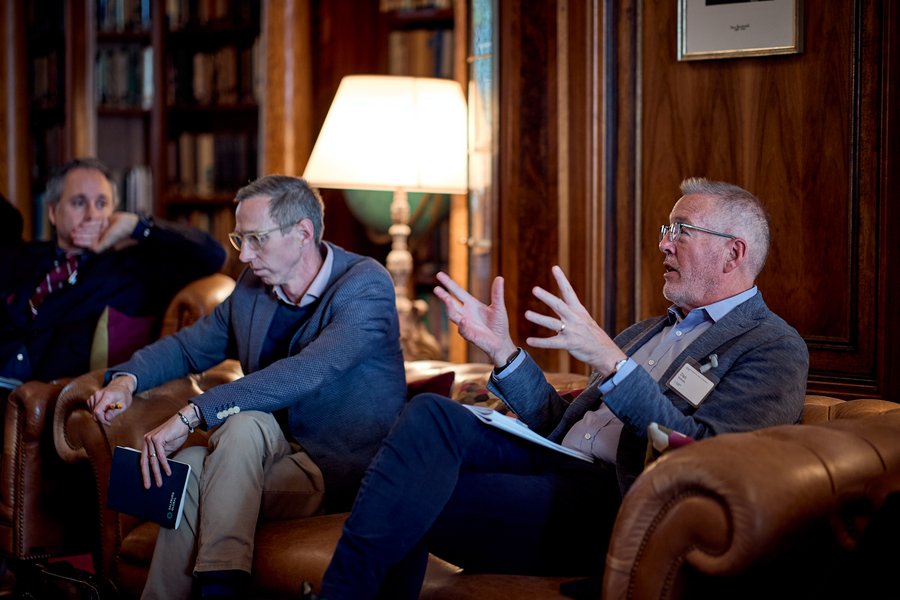In an era marked by rising polarization and threats to democratic systems, partnerships that foster global dialogue and evidence-based solutions are more critical than ever. Salzburg Global and The Harry Frank Guggenheim Foundation (HFG) have long shared a commitment to engaging in critical dialogue around pressing topics of peace and conflict. In 2024, Salzburg Global and HFG established the Violent Threats to Democratic Systems project, which aims to develop an international interdisciplinary network of researchers and stakeholders working on understanding and addressing rising polarization and political violence in various mature democratic states.
During the first session in September 2024, Fellows defined these key concepts, laying the groundwork for a global conversation about the resilience of democratic systems. For the group’s second convening held in September 2025, discussions built on those insights, concentrating on current trends and the steps needed to prevent violence from becoming entrenched in democratic systems.
In September, ahead of the second convening of this network, I connected with Daniel F. Wilhelm, President of the Foundation, to reflect on the partnership and the broader significance of institutional collaboration in today’s shifting global landscape.
Shared Purpose, Shared Impact
When asked about the foundation of a successful partnership, Dan emphasized the importance of a shared worldview:
“HFG exists to create and disseminate knowledge, particularly about violence and what to do about it. That basic insight—identifying and amassing a body of evidence, engaging people who may not always agree but who enter into dialogue in a spirit of candor and goodwill—is incredibly important but increasingly rare. My experience is that Salzburg Global has a similar view.”
This alignment has enabled both organizations to convene diverse voices and foster productive dialogue grounded in research and mutual respect.
The Power of Global Networks
Dan also spoke to the value of Salzburg Global’s international network:
“It doesn’t take a tremendous leap of imagination to believe it’s a good thing to get smart people together to talk about tough issues. When those conversations are well-structured and well-facilitated, they can build lasting bonds. We’ve seen work that began over coffee or drinks at Salzburg evolve into meaningful collaborations.”
These connections, he noted, extend beyond the sessions themselves, allowing Fellows to “conspire in a positive way” in their professional lives and continue the work long after the convenings end.
From Understanding to Action
While research remains HFG’s strong suit, Dan highlighted the importance of moving beyond problem definition toward actionable solutions:
“In our current programs, we’re trying to identify implementable solutions. That’s an endeavor that draws heavily on research—and on the people we support to do meaningful research around the world. Our institutional strengths are well suited to Salzburg’s mission.”
This synergy has helped shape the Violent Threats to Democratic Systems project into a space not only for analysis but for innovation and impact.
Why Partnerships Matter Now More Than Ever
Finally, Dan reflected on the broader importance of institutional partnerships in a rapidly changing world:
“Given all the changes occurring within the United States and the liberal, rules-based post-war order it helped create, it’s vital that issues of significance are examined in environments committed to fostering international dialogue. Salzburg Global’s deep understanding of both the U.S. and the wider world makes it a particularly appealing partner for us.”
As global challenges grow more complex and interconnected, partnerships like the one between Salzburg Global and HFG offer a model for how institutions can work together to advance understanding, build bridges across divides, and promote meaningful change.
About Daniel Wilhelm
Daniel is president of The Harry Frank Guggenheim Foundation, a leader in creating and disseminating knowledge on violence in its many forms, including war, crime and human aggression. Guggenheim research and programs seek to illuminate the nature of, and responses to, issues of violence in the United States and internationally. Daniel previously served as vice president and chief program officer of the Vera Institute of Justice, a non-governmental organization working to improve systems of justice. There he was responsible for developing and overseeing the institute's work on victimization, mass incarceration, racial justice, and other areas. He has written and testified widely on crime and justice issues. Daniel is a graduate of Northwestern University School of Law, Harvard Divinity School, and the School of Foreign Service at Georgetown University. Daniel is a Fellow of Salzburg Global.


